ESL Teacher Average Salary in Nigeria 2024
How much money does a person working as ESL Teacher make in Nigeria?

LOW
144,000
NGN AVERAGE
294,000
NGN HIGH
458,000
NGN
A person working as ESL Teacher in Nigeria typically earns around 294,000 NGN. Salaries range from 144,000 NGN (lowest) to 458,000 NGN (highest).
Salary Variance
This is the average salary including housing, transport, and other benefits. ESL Teacher salaries in Nigeria vary drastically based on experience, skills, gender, or location. Below you will find a detailed breakdown based on many different criteria.
ESL Teacher Pay Scale and Salaries in Nigeria
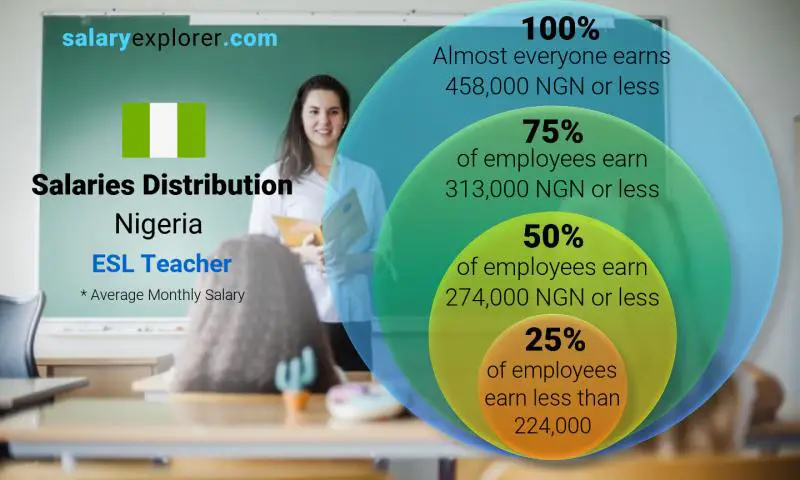
Salary Structure and Pay Scale Comparison
272,000 NGN or more
240,000 to 272,000 NGN
171,000 NGN or less
171,000 to 240,000 NGN
 144,000 NGN |
 274,000 NGN |
 458,000 NGN |
Median Salary, maximum and minimum salary, minimum wage, starting salary, and the salary range
Salary Range, Minimum Wage, and Starting Salary
Salaries for the position ESL Teacher in Nigeria range from 144,000 NGN (starting salary) to 458,000 NGN (maximum salary). It should be noted that the given figure is not the legally mandated minimum wage; rather, it represents the lowest figure reported in a salary survey that included thousands of participants and professionals from all regions of the country.
Median Salary
With a median salary of 274,000 NGN, half of the professionals who work as ESL Teacher in Nigeria earn less than this amount, and the other half earn more. The median salary denotes the middle value of salaries. Ideally, you would want to belong to the group earning more than the median salary, located on the right side of the salary distribution graph.
Percentiles and Salary Scale
The median is closely associated with two other values known as the 25th and 75th percentiles. By examining the salary distribution chart, it can be determined that 25% of professionals employed as ESL Teacher in Nigeria earn less than 224,000 NGN, while 75% earn more. Similarly, the chart shows that 75% earn less than 313,000 NGN while 25% earn more.
Pay Scale Structure
To provide a better understanding of expected salaries, we categorized the frequently occurring salaries into different ranges. This approach provides a more precise representation of salary distribution for the job title ESL Teacher in Nigeria compared to simply calculating the average. The majority of reported salaries, approximately 65%, fall within the range of 171,000 NGN to 240,000 NGN. About 20% of salaries are below the 171,000 NGN mark, while 10% fall within the range of 240,000 NGN to 272,000 NGN. Only 5% of individuals have salaries exceeding 272,000 NGN.
Salary Comparison by Years of Experience / ESL Teacher / Nigeria
How do experience and age affect pay?
| 0 - 2 Years | 171,000 NGN | |
| 2 - 5 Years | +29% | 219,000 NGN |
| 5 - 10 Years | +38% | 302,000 NGN |
| 10 - 15 Years | +24% | 375,000 NGN |
| 15 - 20 Years | +7% | 401,000 NGN |
| 20+ Years | +7% | 428,000 NGN |
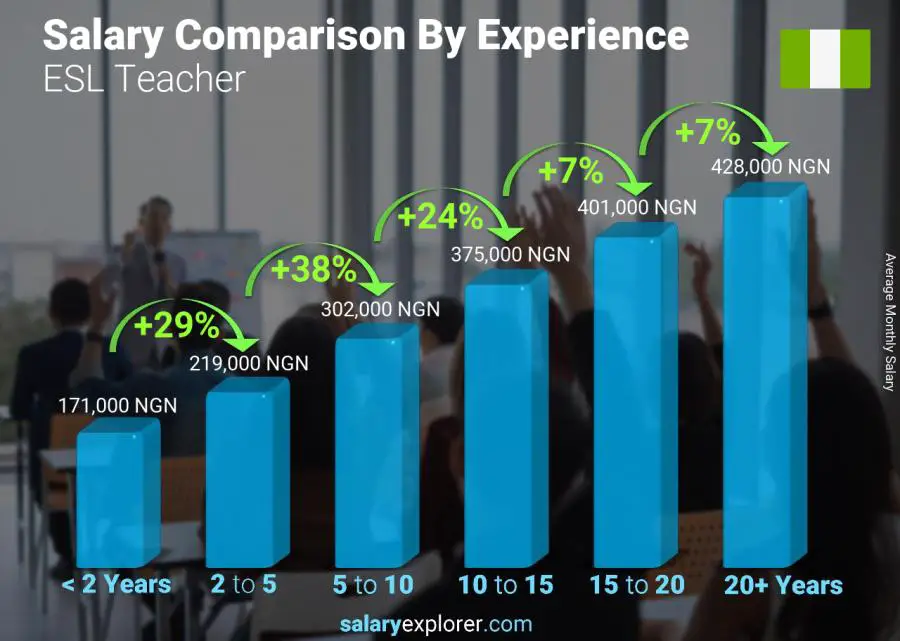
The experience level is the most important factor in determining the salary. Naturally, the more years of experience the higher the wage. We broke down salaries by experience level for people working as ESL Teacher and this is what we found.
Employees with less than two years of experience earn approximately 171,000 NGN.
While someone with an experience level between two and five years is expected to earn 219,000 NGN, 29% more than someone with less than two year's experience.
Moving forward, an experience level between five and ten years lands a salary of 302,000 NGN, 38% more than someone with two to five years of experience.
Additionally, professionals whose expertise span anywhere between ten and fifteen years get a salary equivalent to 375,000 NGN, 24% more than someone with five to ten years of experience.
If the experience level is between fifteen and twenty years, then the expected wage is 401,000 NGN, 7% more than someone with ten to fifteen years of experience.
Lastly, employees with more than twenty years of professional experience get a salary of 428,000 NGN, 7% more than people with fifteen to twenty years of experience.
Typical Salary Progress for Most Careers
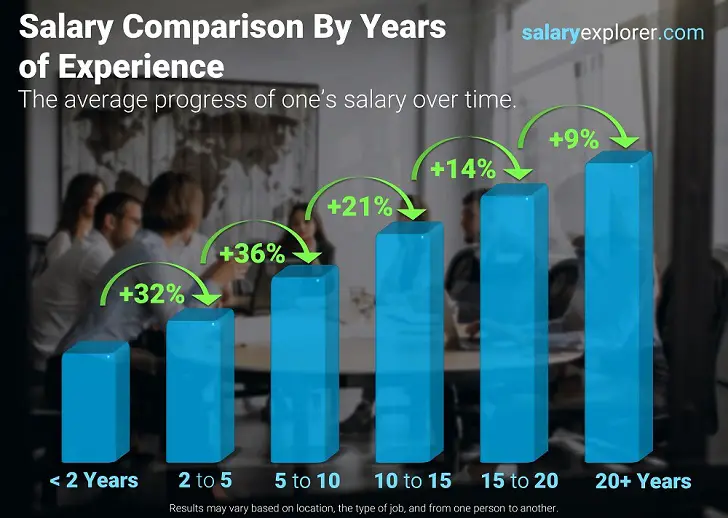
Salary Comparison By Education / ESL Teacher / Nigeria
How do education levels affect salaries?
Displayed below is the average salary variance between different education levels of professionals working as ESL Teacher.
| Bachelor's Degree | 213,000 NGN | |
| Master's Degree | +60% | 342,000 NGN |
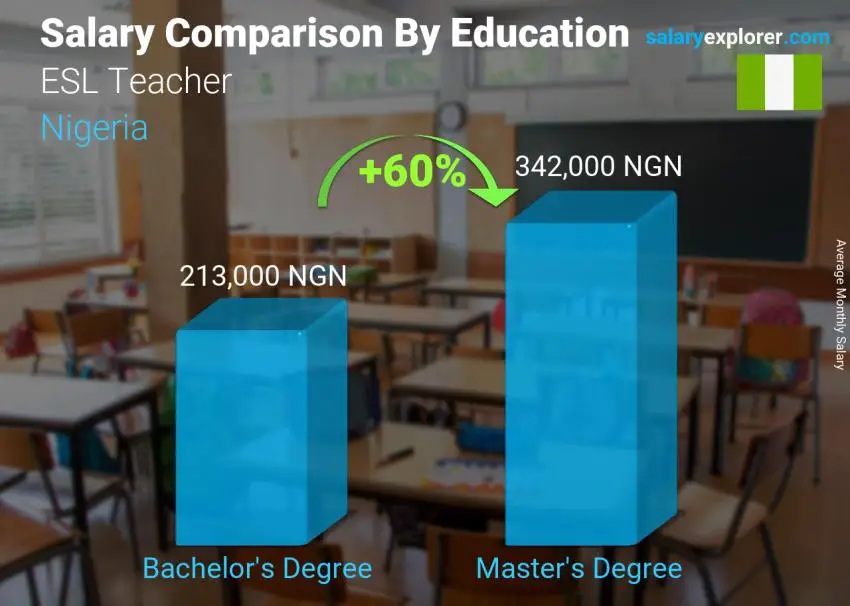
We all know that higher education equals a bigger salary, but how much more money can a degree add to your income? We broke down salaries by education level for the position ESL Teacher in order to make a comparison.
Level 1: Bachelor's Degree
Employees at this education level have an average salary of 213,000 NGN.
Level 2: Master's Degree
At this level, the average salary becomes 342,000 NGN, 60% more than the previous level.
Is a Master's degree or an MBA worth it? Should you pursue higher education?
A Master's degree program or any post-graduate program in Nigeria costs anywhere from 1,700,000 NGN to 5,100,000 NGN and lasts approximately two years. That is quite an investment.
You can't really expect any salary increases during the study period, assuming you already have a job. In most cases, a salary review is conducted once education is completed and the degree has been attained.
Many people pursue higher education as a tactic to switch to a higher-paying job. The numbers seem to support the theory. The average increase in compensation while changing jobs is approximately 10% more than the customary salary increment.
If you can afford the costs of higher education, the return on investment is definitely worth it. You should be able to recover the costs in roughly a year or so.
Typical Salary Difference by Education for Most Careers

Salary and Compensation Comparison By Gender / ESL Teacher / Nigeria
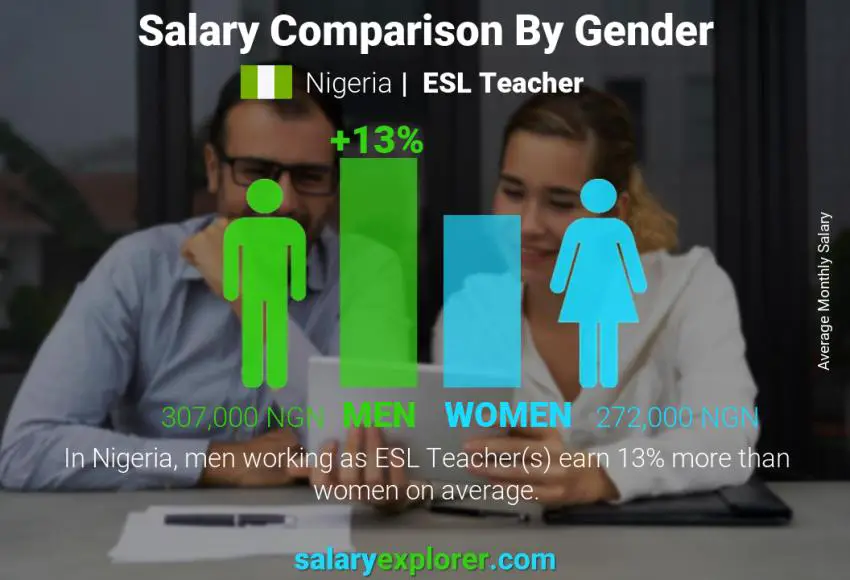
Though gender should not have an effect on pay, in reality, it does. So who gets paid more: men or women? For the people who work as ESL Teacher in Nigeria, the average difference between the salary of male and female employees is 13%.
| Male | 307,000 NGN | |
| Female | -11% | 272,000 NGN |
Salary Comparison By Gender in Nigeria for all Careers

Average Annual Salary Increment Percentage / ESL Teacher / Nigeria
How much are annual salary increments in Nigeria for individuals working as ESL Teacher? How often do employees get salary raises?
Individuals working as ESL Teacher in Nigeria are likely to observe a salary increase of approximately 10% every 20 months. The national average annual increment for all professions combined is 8% granted to employees every 19 months.
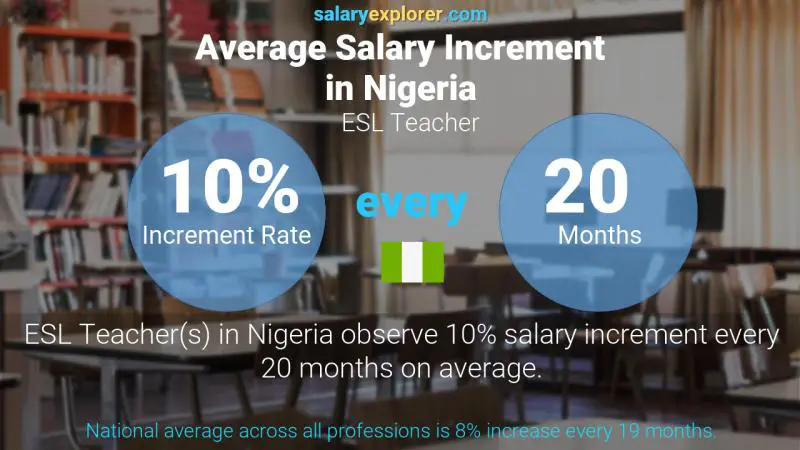
Nigeria / All Professions
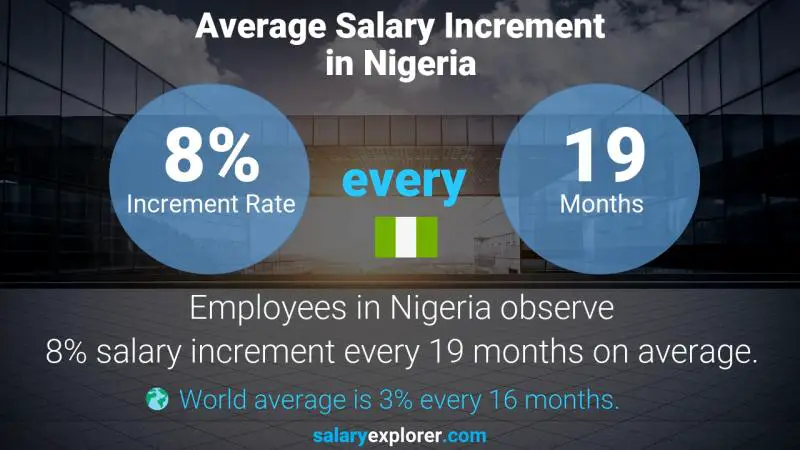
The term Annual Salary Increase usually refers to the increase in 12 calendar month period, but because it is rare that people get their salaries reviewed exactly on the one-year mark, it is more meaningful to know the frequency and the rate at the time of the increase.
How to calculate the salary increment percentage?
The annual salary Increase in a calendar year (12 months) can be easily calculated as follows: Annual Salary Increase = Increase Rate x 12 / Increase Frequency
Worldwide Salary Raises: All Countries and All Jobs
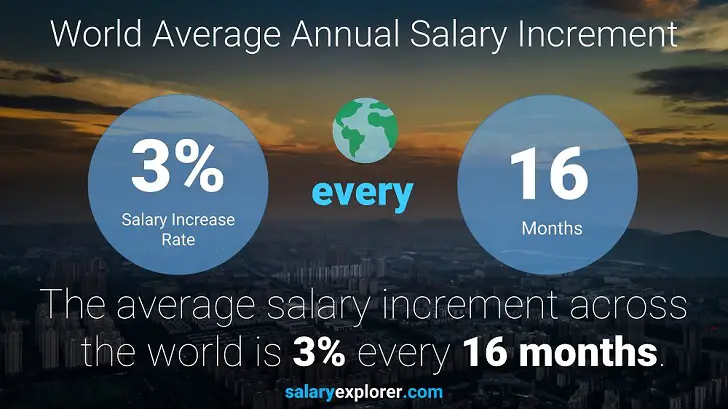
Salary Packages and Schemes
Not all compensation increases are reflected directly in the salary. Some companies offer upgraded packages to their staff instead of cash money. The figures displayed here account only for direct increments to the base salary.
Bonus and Incentive Rates / ESL Teacher / Nigeria
How much and how often are bonuses being awarded? Share This Chart Tweet Get Chart Linkhttp://www.salaryexplorer.com/charts/nigeria/teaching-education/esl-teacher/annual-salary-bonus-rate-nigeria-esl-teacher.jpg
Share This Chart Tweet Get Chart Linkhttp://www.salaryexplorer.com/charts/nigeria/teaching-education/esl-teacher/annual-salary-bonus-rate-nigeria-esl-teacher.jpg
73% of surveyed staff reported that they haven't received any bonuses or incentives in the previous year while 27% said that they received at least one form of monetary bonus.
Those who got bonuses reported rates ranging from 0% to 4% of their annual salary.
| Received Bonus | 27% | |
| No Bonus | 73% |
Types of Bonuses Considered
Individual Performance-Based BonusesThe most standard form of bonus, where the employee is awarded based on their exceptional performance.
Company Performance BonusesOccasionally, some companies like to celebrate excess earnings and profits with their staff collectively in the form of bonuses that are granted to everyone. The amount of the bonus will probably be different from person to person depending on their role within the organization.
Goal-Based BonusesGranted upon achieving an important goal or milestone.
Holiday / End of Year BonusesThese types of bonuses are given without a reason and usually resemble an appreciation token.
Bonuses Are Not Commissions!
People tend to confuse bonuses with commissions. A commission is a prefixed rate at which someone gets paid for items sold or deals completed while a bonus is in most cases arbitrary and unplanned.
What makes a position worthy of good bonuses and a high salary?
The main two types of jobs | |
| Revenue Generators | Supporting Cast |
Employees that are directly involved in generating revenue or profit for the organization. Their field of expertise usually matches the type of business. | Employees that support and facilitate the work of revenue generators. Their expertise is usually different from that of the core business operations. |
Example: | Example: |
Revenue generators usually get more and higher bonuses, higher salaries, and more frequent salary increments. The reason is quite simple: it is easier to quantify your value to the company in monetary terms when you participate in revenue generation.
Bonus Comparison by Seniority Level
Top management personnel and senior employees naturally exhibit higher bonus rates and frequencies than juniors. This is very predictable due to the inherent responsibilities of being higher in the hierarchy. People in top positions can easily get double or triple bonus rates than employees down the pyramid.
Average Hourly Wage / ESL Teacher / Nigeria
 1,690 NGN per hour
1,690 NGN per hourThe average hourly wage (pay per hour) for individuals working as ESL Teacher in Nigeria is 1,690 NGN.This is the rate they get paid for every worked hour.
About The Hourly Pay Rate
The hourly wage is the salary paid in one worked hour. Usually, jobs are classified into two categories: salaried jobs and hourly jobs. Salaried jobs pay a fixed amount regardless of the hours worked. Hourly jobs pay per worked hour. To convert salary into hourly wage the above formula is used (assuming 5 working days in a week and 8 working hours per day which is the standard for most jobs). The hourly wage calculation may differ slightly depending on the worked hours per week and the annual vacation allowance. The figures mentioned above are good approximations and are considered to be the standard. One major difference between salaried employees and hourly paid employees is overtime eligibility. Salaried employees are usually exempt from overtime as opposed to hourly paid staff.
What is the minimum hourly rate of pay?
The minimum pay rate per hour for people working as ESL Teacher in Nigeria is 830 NGN. This is the minimum as per the gathered data in the salary survey not the minimum hourly rate mandated by law.
Salary comparison with similar jobs
| Job Title | Average Salary |
| Teaching / Education |  -100% -100% | |
| Academic Advisor | 364,000 NGN |  +24% +24% |
| Academic Assistant | 246,000 NGN |  -16% -16% |
| Academic Coach | 344,000 NGN |  +17% +17% |
| Academic Librarian | 251,000 NGN |  -14% -14% |
| Academic Manager | 408,000 NGN |  +39% +39% |
| Academic Specialist | 295,000 NGN |  +0% +0% |
| Academic Staff | 271,000 NGN |  -8% -8% |
| Accompanist | 304,000 NGN |  +4% +4% |
| Achievement Coach | 341,000 NGN |  +16% +16% |
| Admissions Specialist | 317,000 NGN |  +8% +8% |
| Agricultural Sciences Teacher | 262,000 NGN |  -11% -11% |
| Anthropology Teacher | 275,000 NGN |  -6% -6% |
| Arabic Language Teacher | 258,000 NGN |  -12% -12% |
| Archeology Teacher | 288,000 NGN |  -2% -2% |
| Architecture Teacher | 300,000 NGN |  +2% +2% |
| Archivist | 241,000 NGN |  -18% -18% |
| Art Teacher | 270,000 NGN |  -8% -8% |
| Assistant School Principal | 348,000 NGN |  +19% +19% |
| Assistant Teacher | 242,000 NGN |  -18% -18% |
| Biochemistry Professor | 489,000 NGN |  +67% +67% |
| Biology Teacher | 288,000 NGN |  -2% -2% |
| Blended Learning Specialist | 362,000 NGN |  +23% +23% |
| Bursary Scheme Manager | 322,000 NGN |  +10% +10% |
| Business Teacher | 296,000 NGN |  +1% +1% |
| Careers Advisor | 352,000 NGN |  +20% +20% |
| Careers Consultant | 350,000 NGN |  +19% +19% |
| Chemistry Teacher | 264,000 NGN |  -10% -10% |
| Chief Remote Learning Officer | 454,000 NGN |  +55% +55% |
| Child Care Coordinator | 289,000 NGN |  -2% -2% |
| Child Care Worker | 223,000 NGN |  -24% -24% |
| Childcare Worker | 228,000 NGN |  -22% -22% |
| Classroom Assistant | 235,000 NGN |  -20% -20% |
| Clinical School Psychologist | 410,000 NGN |  +40% +40% |
| Coding Coach | 292,000 NGN |  -1% -1% |
| College Aide | 348,000 NGN |  +19% +19% |
| College and Career Readiness Specialist | 353,000 NGN |  +20% +20% |
| College Dean | 651,000 NGN |  +120% +120% |
| College President | 618,000 NGN |  +110% +110% |
| Communications Teacher | 291,000 NGN |  -1% -1% |
| Community Education Officer | 242,000 NGN |  -18% -18% |
| Computer Science Teacher | 279,000 NGN |  -5% -5% |
| Computer Teacher | 269,000 NGN |  -8% -8% |
| Creative Writing Trainer | 344,000 NGN |  +17% +17% |
| Credit Counselor | 355,000 NGN |  +21% +21% |
| Cultural Studies Teacher | 279,000 NGN |  -5% -5% |
| Curriculum Coordinator | 315,000 NGN |  +7% +7% |
| Curriculum Developer | 365,000 NGN |  +24% +24% |
| Curriculum Specialist | 354,000 NGN |  +21% +21% |
| Dean of Faculty | 637,000 NGN |  +120% +120% |
| Demonstrator | 255,000 NGN |  -13% -13% |
| Deputy Controller of Examinations | 328,000 NGN |  +12% +12% |
| Digital Citizenship Educator | 260,000 NGN |  -11% -11% |
| Digital Literacy Instructor | 284,000 NGN |  -3% -3% |
| Director of Learning Technology | 389,000 NGN |  +33% +33% |
| Distance Learning Coordinator | 317,000 NGN |  +8% +8% |
| E-Learning Consultant | 391,000 NGN |  +33% +33% |
| E-learning Content Developer | 360,000 NGN |  +23% +23% |
| E-Learning Designer | 366,000 NGN |  +25% +25% |
| Economics Lecturer | 502,000 NGN |  +71% +71% |
| Economics Teacher | 281,000 NGN |  -4% -4% |
| EdTech Compliance Manager | 317,000 NGN |  +8% +8% |
| EdTech Consultant | 314,000 NGN |  +7% +7% |
| EdTech Content Creator | 281,000 NGN |  -4% -4% |
| Education Administrator | 331,000 NGN |  +13% +13% |
| Education Assistant | 253,000 NGN |  -14% -14% |
| Education Assistant Director | 363,000 NGN |  +24% +24% |
| Education Assistant Librarian | 203,000 NGN |  -31% -31% |
| Education Assistant Principal | 296,000 NGN |  +1% +1% |
| Education Assistant Professor | 384,000 NGN |  +31% +31% |
| Education Associate | 273,000 NGN |  -7% -7% |
| Education Consultant | 394,000 NGN |  +34% +34% |
| Education Coordinator | 302,000 NGN |  +3% +3% |
| Education Counselor | 319,000 NGN |  +9% +9% |
| Education Director | 510,000 NGN |  +74% +74% |
| Education Policy Analyst | 395,000 NGN |  +35% +35% |
| Education Program Specialist | 342,000 NGN |  +17% +17% |
| Education Researcher | 410,000 NGN |  +40% +40% |
| Education Resource Specialist | 299,000 NGN |  +2% +2% |
| Education Services Facilitator | 334,000 NGN |  +14% +14% |
| Education Technology Specialist | 306,000 NGN |  +4% +4% |
| Educational Content Writer | 360,000 NGN |  +23% +23% |
| Educational Data Privacy Officer | 330,000 NGN |  +12% +12% |
| Educational Psychologist | 432,000 NGN |  +47% +47% |
| EFL Teacher | 282,000 NGN |  -4% -4% |
| eLearning Trainer | 257,000 NGN |  -12% -12% |
| Elementary School Teacher | 240,000 NGN |  -18% -18% |
| Engineering Lecturer | 483,000 NGN |  +65% +65% |
| Engineering Teacher | 392,000 NGN |  +34% +34% |
| English Teacher | 263,000 NGN |  -10% -10% |
| ESL Teacher | 294,000 NGN |  +0% +0% |
| Faculty Assistant | 340,000 NGN |  +16% +16% |
| Foreign Language Teacher | 247,000 NGN |  -16% -16% |
| GED Teacher | 258,000 NGN |  -12% -12% |
| Geography Teacher | 258,000 NGN |  -12% -12% |
| Head of Mathematics Department | 363,000 NGN |  +24% +24% |
| Head of School | 469,000 NGN |  +60% +60% |
| High School Teacher | 290,000 NGN |  -1% -1% |
| History Teacher | 278,000 NGN |  -5% -5% |
| Infant Teacher | 206,000 NGN |  -30% -30% |
| Instructional Assistant | 299,000 NGN |  +2% +2% |
| Instructional Coach | 325,000 NGN |  +11% +11% |
| Instructor | 312,000 NGN |  +6% +6% |
| Kindergarten Teacher | 225,000 NGN |  -23% -23% |
| Language Instructor For Expatriate | 238,000 NGN |  -19% -19% |
| Law Teacher | 405,000 NGN |  +38% +38% |
| Learning Designer | 340,000 NGN |  +16% +16% |
| Learning Experience Designer | 386,000 NGN |  +31% +31% |
| Learning Management System Administrator | 321,000 NGN |  +9% +9% |
| Lecturer | 462,000 NGN |  +57% +57% |
| Librarian | 238,000 NGN |  -19% -19% |
| Library Assistant | 186,000 NGN |  -37% -37% |
| Library Director | 320,000 NGN |  +9% +9% |
| Library Specialist | 231,000 NGN |  -21% -21% |
| Library Technician | 215,000 NGN |  -27% -27% |
| Life Sciences Teacher | 267,000 NGN |  -9% -9% |
| Makerspace Coordinator and Facilitator | 260,000 NGN |  -11% -11% |
| Math Lecturer | 476,000 NGN |  +62% +62% |
| Math Teacher | 298,000 NGN |  +2% +2% |
| Mathematics Teacher | 314,000 NGN |  +7% +7% |
| Mentor | 319,000 NGN |  +9% +9% |
| Middle School Teacher | 304,000 NGN |  +4% +4% |
| Music Teacher | 265,000 NGN |  -10% -10% |
| Nursery Manager | 427,000 NGN |  +45% +45% |
| Nursery Worker | 169,000 NGN |  -42% -42% |
| Online Course Developer | 324,000 NGN |  +10% +10% |
| Online Course Instructor | 292,000 NGN |  -1% -1% |
| Online Learning Facilitator | 277,000 NGN |  -6% -6% |
| Online Tutor | 254,000 NGN |  -13% -13% |
| Paraprofessional | 359,000 NGN |  +22% +22% |
| Personalized Learning Specialist | 345,000 NGN |  +18% +18% |
| Physical Education Specialist | 308,000 NGN |  +5% +5% |
| Physical Education Teacher | 248,000 NGN |  -16% -16% |
| Physics Teacher | 290,000 NGN |  -1% -1% |
| Political Science Teacher | 304,000 NGN |  +4% +4% |
| Post Doctoral Researcher | 417,000 NGN |  +42% +42% |
| Preschool Education Administrator | 302,000 NGN |  +3% +3% |
| Preschool Teacher | 230,000 NGN |  -22% -22% |
| Primary School Teacher | 260,000 NGN |  -11% -11% |
| Principal | 414,000 NGN |  +41% +41% |
| Product Specialist | 313,000 NGN |  +7% +7% |
| Professor - Accounting | 499,000 NGN |  +70% +70% |
| Professor - Architecture | 486,000 NGN |  +66% +66% |
| Professor - Biology | 499,000 NGN |  +70% +70% |
| Professor - Business Administration | 466,000 NGN |  +59% +59% |
| Professor - Chemical Engineering | 541,000 NGN |  +84% +84% |
| Professor - Chemistry | 510,000 NGN |  +74% +74% |
| Professor - Civil Engineering | 501,000 NGN |  +71% +71% |
| Professor - Communication | 477,000 NGN |  +62% +62% |
| Professor - Computer Science | 481,000 NGN |  +64% +64% |
| Professor - Dentistry | 531,000 NGN |  +81% +81% |
| Professor - Drama | 469,000 NGN |  +60% +60% |
| Professor - Economics | 535,000 NGN |  +82% +82% |
| Professor - Education | 505,000 NGN |  +72% +72% |
| Professor - Electrical Engineering | 504,000 NGN |  +72% +72% |
| Professor - English | 484,000 NGN |  +65% +65% |
| Professor - Environmental Engineering | 496,000 NGN |  +69% +69% |
| Professor - Foreign Languages | 487,000 NGN |  +66% +66% |
| Professor - Geological Sciences | 484,000 NGN |  +65% +65% |
| Professor - History | 517,000 NGN |  +76% +76% |
| Professor - Industrial Engineering | 492,000 NGN |  +68% +68% |
| Professor - Law | 511,000 NGN |  +74% +74% |
| Professor - Legal Support | 483,000 NGN |  +65% +65% |
| Professor - Liberal Arts | 483,000 NGN |  +65% +65% |
| Professor - Marketing | 490,000 NGN |  +67% +67% |
| Professor - Mathematics | 559,000 NGN |  +90% +90% |
| Professor - Mechanical Engineering | 524,000 NGN |  +79% +79% |
| Professor - Medical Administration | 559,000 NGN |  +90% +90% |
| Professor - Medicine | 604,000 NGN |  +110% +110% |
| Professor - Music | 442,000 NGN |  +51% +51% |
| Professor - Nursing | 481,000 NGN |  +64% +64% |
| Professor - Pharmaceutical Sciences | 486,000 NGN |  +66% +66% |
| Professor - Philosophy | 519,000 NGN |  +77% +77% |
| Professor - Physical Therapy | 523,000 NGN |  +78% +78% |
| Professor - Physics | 517,000 NGN |  +76% +76% |
| Professor - Psychology | 498,000 NGN |  +70% +70% |
| Professor - Rehabilitation | 445,000 NGN |  +52% +52% |
| Professor - Social Work | 463,000 NGN |  +58% +58% |
| Professor - Sociology | 485,000 NGN |  +65% +65% |
| Professor - Special Education | 522,000 NGN |  +78% +78% |
| Psychology Teacher | 403,000 NGN |  +37% +37% |
| Public Management Assistant Professor | 402,000 NGN |  +37% +37% |
| School Counselor | 392,000 NGN |  +34% +34% |
| Science Educator | 277,000 NGN |  -6% -6% |
| Science Laboratory Assistant | 252,000 NGN |  -14% -14% |
| Science Teacher | 270,000 NGN |  -8% -8% |
| Secondary Mathematics Teacher | 299,000 NGN |  +2% +2% |
| Secondary School Teacher | 283,000 NGN |  -4% -4% |
| Special Education Advocate | 347,000 NGN |  +18% +18% |
| Special Education Teacher | 296,000 NGN |  +1% +1% |
| Special Needs Assistant | 231,000 NGN |  -21% -21% |
| Statistics Lecturer | 476,000 NGN |  +62% +62% |
| STEAM Educator | 257,000 NGN |  -12% -12% |
| STEM Educator | 267,000 NGN |  -9% -9% |
| Student Accounts Coordinator | 257,000 NGN |  -12% -12% |
| Student Development Specialist | 324,000 NGN |  +10% +10% |
| Student Employment Specialist | 294,000 NGN |  +0% +0% |
| Student Services | 247,000 NGN |  -16% -16% |
| Student Services Coordinator | 256,000 NGN |  -13% -13% |
| Student Support Manager | 327,000 NGN |  +11% +11% |
| Substitute Teacher | 230,000 NGN |  -22% -22% |
| Teacher | 259,000 NGN |  -12% -12% |
| Teacher Aide | 206,000 NGN |  -30% -30% |
| Teacher Trainer | 344,000 NGN |  +17% +17% |
| Teaching Assistant | 214,000 NGN |  -27% -27% |
| TEFL Teacher | 284,000 NGN |  -3% -3% |
| Training and Development Specialist | 353,000 NGN |  +20% +20% |
| Training Coordinator | 261,000 NGN |  -11% -11% |
| Tutor | 270,000 NGN |  -8% -8% |
| University Teacher | 498,000 NGN |  +70% +70% |
| Virtual Teacher | 253,000 NGN |  -14% -14% |
| Vocational Education Teacher | 274,000 NGN |  -7% -7% |
Government vs Private Sector Salary Comparison
Where can you get paid more, working in a private company or the government? The difference between the public or government sector salaries and the private sector salaries in Nigeria is 6% on average across all career fields.
| Private Sector | 329,000 NGN | |
| Public Sector | +6% | 349,000 NGN |
Salary Statistics and Calculation Guide
What is considered to be a good and competitive salary for the job title ESL Teacher in Nigeria?
A good and competitive compensation would range anywhere between 274,000 NGN and 313,000 NGN. This is a very rough estimate. Experience and education play a very huge part in the final earnings.
Gross Salary (before tax) and Net Salary (after tax)
All salary and compensation figures displayed here are gross salary figures, that is the salary before tax deductions. Because taxes may differ across sectors and locations, it is difficult to accurately calculate the net salary after tax for every career.
Base / Basic Salary
The base salary for a careers like ESL Teacher in Nigeria ranges from 144,000 NGN to 224,000 NGN. The base salary depends on many factors including experience and education. It is not easy to provide a figure with very little information, so take this range with a grain of salt.
What is the difference between the median and the average salary?
Both are indicators. If your salary is higher than both the average and the median then you are doing very well. If your salary is lower than both, then many people earn more than you and there is plenty of room for improvement. If your wage is between the average and the median, then things can be a bit complicated. We wrote a guide to explain all about the different scenarios. How to compare your salary




